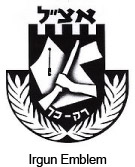
IRGUN TSVA’I LE’UMI “The National Military Organization” (Etzel, I.Z.L.)
The Irgun, abbreviation for Ha’Irgun Ha’Tsvai Ha’Leumi B’Eretz Yisrael, or “National Military Organization of the Land of Israel”, was a militant Zionist group that operated in Palestine between 1931 and 1948. The Irgun was (and still is) also commonly referred to as Etzel, an acronym of its Hebrew initials. The organization was a political predecessor to Israel’s right wing Herut (“Freedom”) party, which became the backbone of today’s Likud party.
The founder and driving force of the Irgun was a Ukrainian Jew named Vladimir Jabotinsky. Jabotinsky, who took on the name Ze’ev upon his arrival in Palestine, was the initiator of what became Revisionist Zionism – a non Socialist alternative to the leading Zionist organization. The Irgun was initially comprised of members of “Betar”, Jabotinsky’s original Revisionist Zionist youth movement, founded in 1923 in Riga, Latvia, and by soldiers who had deserted the Haganah, the underground army of the yishuv (early Jewish settlers).
Jabotinsky formulated the ideal of the Irgun, basing it on his own opinion that every Jew had the right to enter Palestine and the right to active retaliation against the Arabs and the British. He vehemently believed that only a Jewish armed force would ensure a Jewish state, on both sides of the Jordan River.
Although its beginnings were more or less political, the Irgun was undeniably a military organization. Drill exercises were conducted many times daily and there was a constant emphasis on strict discipline. The Irgun’s members had extensive arms training including handguns, submachine guns and hand grenades, which were smuggled into Palestine from Italy and Poland or stolen from the British forces. As its military proficiency grew, the Irgun even published professional publications on combat guidelines, leadership, and weaponry.
In the 1930’s, the Jewish Agency, which was still trying to cooperate with the British, condemned the Irgun’s armed reprisals against Arab aggression. The Irgun had a tendency of ignoring the decisions made by the mainstream Zionist leadership and institutions, resulting in enormous tension within the Yishuv. The Irgun supplemented its armed operations with public relations campaigns. The goal of these campaigns was to convince the public that the policies of the Irgun were the way to achieve peace and independence. They published an underground newspaper and founded and ran Kol Zion HaLochemet, the first independent Hebrew radio station.
However, the intensive PR campaigns did not sway the Jewish establishment or the British authorities. Consequently, many members of the Irgun were arrested, incarcerated and executed by the British. These actions succeeded only in intensifying the resolve of the Irgun.
The Irgun’s first foray into retaliatory combat was in the aftermath of the horrific Arab riots of 1929 in which hundreds of Jewish men women and children were murdered or